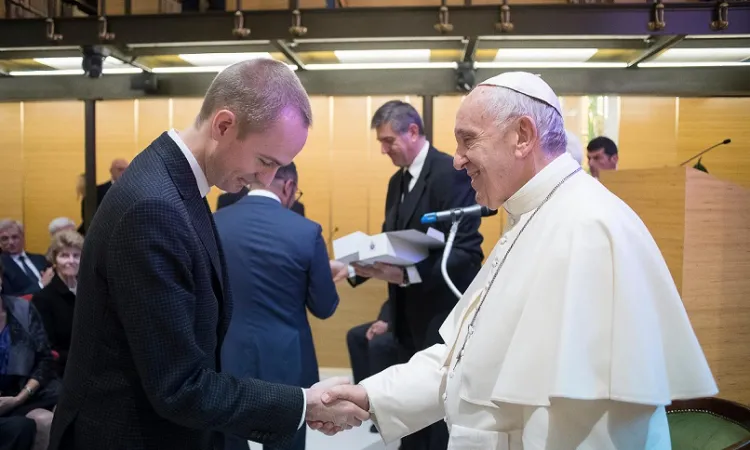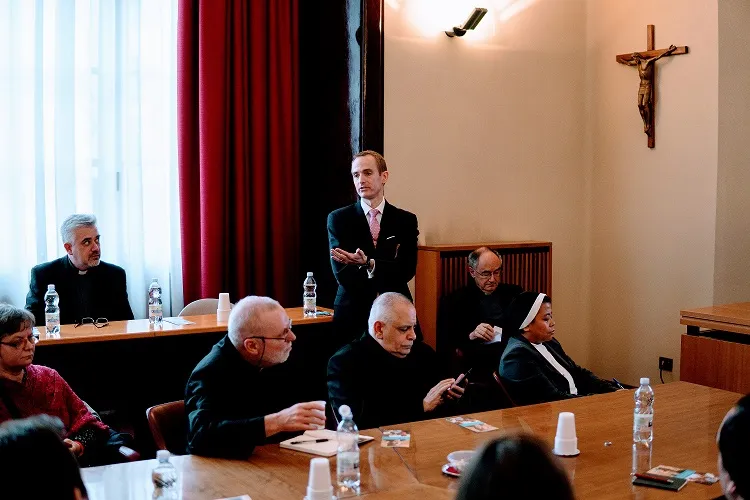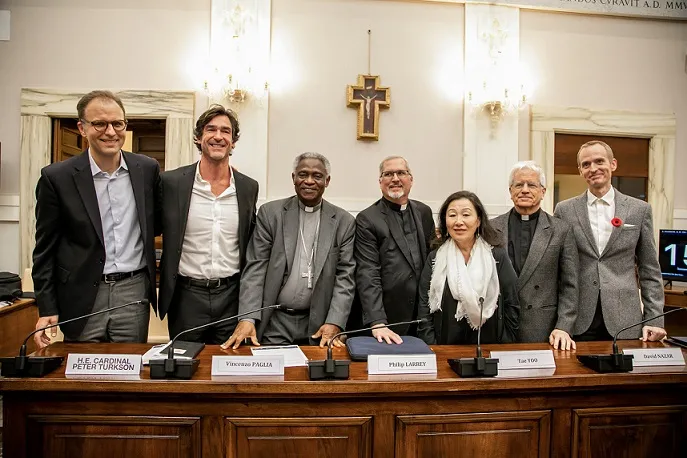Longbeard CEO, Matthew Sanders Talks Magisterium AI, Bridging Faith and Technology

By Tom Thomas, Indian Catholic Matters
Matthew Harvey Sanders runs a technology company, Longbeard, as its Founder & CEO. In the past, the firm has concentrated on implementing technology infrastructure to enhance consumer reach and organisational operations. It now collaborates closely on digital infrastructure projects, such as creating websites and web applications, for the Holy See and other institutions like the Pontifical Oriental Institute to enhance organisational processes and audience reach. Right now, Longbeard’s main focus is on AI applications. Thanks to Mathew and his team, the richness of the unique library at The Pontifical Oriental Institute, which is the leading academic institution for the Eastern Churches, representing the Middle East, East Africa, India, and Eastern Europe, is available to more people around the world through Magisterium AI. Mathew interacted exclusively with Indian Catholic Matters on creating the Magisterium AI and Vulgate AI. Excerpts:
How did the idea of creating Magisterium AI come about?
The Pontifical Oriental Institute reached out to us and wanted to explore how they could make their unique library available to more people around the world. At the time, if you wanted to do research using their library resources, you’d have to come to Rome to do it. This was obviously very expensive, and very few had the privilege. Magisterium AI and later Vulgate AI were answers to this problem. It allowed anyone with an internet connection to access their library resources and engage them in their native languages.

How is this different from other AI services such as Bible AI, ChatGPT, Bard from the perspective of a Catholic?
Good question. OpenAI’s ChatGPT and Google’s Bard were trained on huge chunks of the internet. Naturally, among those contents were a diversity of opinions, many of which do not represent the official teaching of the Church or actively misrepresent it. The problem with these applications is they generate responses but do not inform you from which they source their information. So, how do you know whether ChatGPT or Bard-generated is true or not?
Magisterium AI was created to address this issue and many others. Magisterium AI carefully curates what the AI can reference. So, when in Magisterial Mode, the AI is only referencing and generating from the official teaching of the Church. Moreover, we provide citations so you know from what documents the answer was generated. Currently, our AI is referencing over 5,700 magisterial documents.
Scholarly Mode provides a greater diversity of Catholic thought, going beyond official magisterial teaching to include the writings of St. Thomas Aquinas, St. Augustine, Fathers of the Church, etc. The AI has access to over 2500 works in Scholarly Mode.
The fact that you can switch between Magisterial or Scholarly Modes is one of the unique benefits of Magisterium AI.
Scholarly Mode also includes the Bible as well as important biblical commentaries.

How receptive has the Catholic Church been to Magisterium AI? Can you share feedback from some of the leaders of the Catholic Church in this regard?
I’ve been surprised by how well-received Magisterium AI is. We’ve had supportive notes from multiple bishops, priests, and religious figures from around the world.
The product isn’t perfect, but they understand what we’re trying to do and why and so have been supporting its continued development.
I recently gave a talk at a Catholic Bishops’ Conference on the challenges and opportunities AI is presenting to the Church. It was very well received, and I was delighted by how engaged the participants were. It was obvious that AI is an important issue to them, and they’re concerned and excited.
What are the ‘trending’ questions being asked on Magisterium AI if you can share them?
I’m always fascinated by how many people are interested in exorcism, ha!
Please list out the steps on the best way to use Magisterium AI to further our understanding of the Catholic Church.
Anyone who has used ChatGPT will immediately understand how to use Magisterium AI as our apps share similar UIs (user interfaces).
Visit Magisterium AI and look for the chat box. Type your question, and once Magisterium AI has had a chance to process the data, it will generate a concise answer. Pretty straightforward.
Can you please share some books or quotes from your favourite authors in the area of Catholicism and technology (especially AI)?
- Artificial Humanity by Fr. Philip Larrey
- Connected World by Fr. Philip Larrey
“The inherent dignity of each human being and the fraternity that binds us together as members of the one human family must undergird the development of new technologies and serve as indisputable criteria for evaluating them before they are employed” – Message of the Holy Father for the 57th World Day of Peace.
Please share some thoughts on the future of AI and how you see it impacting the lives of us Catholics in future.
AI is going to reshape our world. I wouldn’t be surprised if, in 10 years, 50% of the world’s population is conventionally unemployed because of AI and robotics.
There are two ways, I feel, we can respond to this inevitability. We can proceed in fear and try to limit or manipulate the market driving these technological forces, or, we can proceed in hope and start to really explore how these technologies could be used to create a new era of abundance.
I feel we need to focus, as a species, on ensuring these technologies are applied in areas that will see the greatest benefit for the greatest number of people. Spiritual growth, education, food, shelter, and health, are all areas AI could supercharge. We simply need governments, companies, and churches, to provide a supportive environment for the creative genius of humanity to flourish.
More specifically for the Church, what we need is a new generation of philosophers and theologians who understand these technologies and their implications deeply and are willing to courageously speak out. The Church has been prophetic in the past in predicting and in many ways helping prevent disasters that may have resulted due to technological advancement. The Church needs to lead once again.
What are your future plans for Magisterium AI?
We plan to foster more partnerships with universities and organizations so we may gain access to greater Catholic insight to share with the world.
We plan to foster more partnerships with universities and organizations so we may gain access to greater Catholic insight to share with the world.
Very soon, Magisterium AI will have a voice, and you’ll be able to talk to the church’s documents.
How can we use technology in a balanced manner without being slaves to it?
My advice is to be as transparent as possible with your spiritual director about your use of technology. It’s their job to ensure you’re on the right spiritual path, and if your technology use is becoming a barrier to spiritual growth, they’ll tell you.
The only other thing I’d say is remember that technology is a tool. It’s neither bad nor good. It comes down to how it’s used. So, use it wisely.
Is there a danger of people moving away from traditional learning methods and relying more on technology and AI applications?
This movement is inevitable, but I’d assert that it’s not necessarily dangerous.
I’m sure when the printing press came out, there were people very concerned that books everywhere would change learning for the worse. We’d now say that’s silly.
Education will adapt, and as long as we’re measuring the extent to which AI in education is supporting human flourishing, I don’t feel we’ve anything to fear.
This article was written by Tom Thomas, Indian Catholic Matters.
Source: https://www.indiancatholicmatters.org/its-time-to-learn-the-teachings-of-the-church-through-ai/












